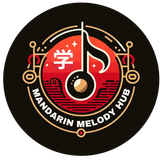Heartache or Stomachache? Learn Chinese Health Vocabulary Through Love

Experience the hilarious chaos of lovesickness as romantic feelings create very real physical symptoms in this charming Mandarin pop ballad.
🎵 Watch & Listen
Originally Released January 3, 2025
🎮 Practice with Interactive Flashcards
Master all the medical and romantic vocabulary from "Lovesick"! Our comprehensive flashcard app includes every word from this song with pronunciation practice, example sentences, and progress tracking.
→ Practice "Lovesick" Flashcards
The Story Behind the Song
"Lovesick" (相思病 / Xiāng sī bìng) takes the universal experience of romantic butterflies and turns it into a medical emergency! Our protagonist experiences increasingly dramatic physical symptoms every time he sees his crush—from racing heartbeats to stomach pains to sleepless nights. What starts as sweet romantic excitement quickly escalates into a full-blown "medical crisis" that has his friends worried and doctors baffled.
This clever pop ballad plays on the traditional Chinese concept of 相思病 (xiāng sī bìng - lovesickness), which was historically recognized as an actual medical condition in Traditional Chinese Medicine. The song brilliantly weaves together romantic vocabulary with essential health and medical terminology, making it perfect for learners who want to acquire practical vocabulary for describing symptoms and medical visits.
The progression from romantic excitement to desperate pleas for medical help creates both humor and an excellent learning opportunity. You'll master everything from basic body parts and symptoms to complex medical expressions, all while enjoying a catchy melody that makes these sometimes-challenging words memorable.
Complete Song Lyrics
Verse 1
{看见|kàn jiàn - see}{她|tā - she}{的|de - possessive}{笑容|xiào róng - smile} ({kàn jiàn|看见 - see} {tā|她 - she} {de|的 - possessive} {xiào róng|笑容 - smile})
Seeing her smile
{心跳|xīn tiào - heartbeat}{突然|tū rán - suddenly}{加速|jiā sù - accelerate} ({xīn tiào|心跳 - heartbeat} {tū rán|突然 - suddenly} {jiā sù|加速 - accelerate})
Heartbeat suddenly accelerates
{以为|yǐ wéi - think}{很|hěn - very}{浪漫|làng màn - romantic}{呢|ne - particle} ({yǐ wéi|以为 - think} {hěn|很 - very} {làng màn|浪漫 - romantic} {ne|呢 - particle})
Thought it was very romantic
{突然|tū rán - suddenly}{不太|bù tài - not very}{对劲|duì jìn - right} ({tū rán|突然 - suddenly} {bù tài|不太 - not very} {duì jìn|对劲 - right})
Suddenly something's not quite right
Chorus
{每次|měi cì - every time}{看到|kàn dào - see}{她|tā - she} ({měi cì|每次 - every time} {kàn dào|看到 - see} {tā|她 - she})
Every time I see her
{我|wǒ - I}{就|jiù - then}{不|bù - not}{舒服|shū fu - comfortable} ({wǒ|我 - I} {jiù|就 - then} {bù|不 - not} {shū fu|舒服 - comfortable})
I feel unwell
{医生|yī shēng - doctor}{快|kuài - quick}{帮忙|bāng máng - help} ({yī shēng|医生 - doctor} {kuài|快 - quick} {bāng máng|帮忙 - help})
Doctor, please help quickly
{治|zhì - treat}{治|zhì - treat}{相思|xiāng sī - longing}{病|bìng - illness} ({zhì|治 - treat} {zhì|治 - treat} {xiāng sī|相思 - longing} {bìng|病 - illness})
Cure this lovesickness
Verse 2
{吃|chī - eat}{了|le - past marker}{很多|hěn duō - many}{药|yào - medicine} ({chī|吃 - eat} {le|了 - past marker} {hěn duō|很多 - many} {yào|药 - medicine})
Took a lot of medicine
{还是|hái shì - still}{治|zhì - treat}{不好|bù hǎo - not good} ({hái shì|还是 - still} {zhì|治 - treat} {bù hǎo|不好 - not good})
Still can't be cured
{吃|chī - eat}{不下|bù xià - can't}{睡|shuì - sleep}{不着|bù zháo - can't} ({chī|吃 - eat} {bù xià|不下 - can't} {shuì|睡 - sleep} {bù zháo|不着 - can't})
Can't eat, can't sleep
{难受|nán shòu - uncomfortable}{得|de - extremely}{要命|yào mìng - deadly} ({nán shòu|难受 - uncomfortable} {de|得 - extremely} {yào mìng|要命 - deadly})
Extremely uncomfortable
Verse 3
{症状|zhèng zhuàng - symptoms}{更|gèng - more}{严重|yán zhòng - serious} ({zhèng zhuàng|症状 - symptoms} {gèng|更 - more} {yán zhòng|严重 - serious})
Symptoms are getting worse
{肚子|dù zi - stomach}{很|hěn - very}{疼|téng - hurt} ({dù zi|肚子 - stomach} {hěn|很 - very} {téng|疼 - hurt})
Stomach really hurts
{救命|jiù mìng - save life}{啊|a - particle}{医生|yī shēng - doctor} ({jiù mìng|救命 - save life} {a|啊 - particle} {yī shēng|医生 - doctor})
Help me, doctor!
{快要|kuài yào - about to}{受|shòu - endure}{不了|bù liǎo - can't}{了|le - particle} ({kuài yào|快要 - about to} {shòu|受 - endure} {bù liǎo|不了 - can't} {le|了 - particle})
I'm about to not be able to stand it
Bridge
{心里|xīn lǐ - in heart}{好|hǎo - very}{着急|zháo jí - anxious} ({xīn lǐ|心里 - in heart} {hǎo|好 - very} {zháo jí|着急 - anxious})
So anxious in my heart
{每天|měi tiān - every day}{都|dōu - all}{想|xiǎng - think of}{她|tā - she} ({měi tiān|每天 - every day} {dōu|都 - all} {xiǎng|想 - think of} {tā|她 - she})
Think of her every day
{朋友|péng yǒu - friend}{都|dōu - all}{担心|dān xīn - worry}{我|wǒ - me} ({péng yǒu|朋友 - friend} {dōu|都 - all} {dān xīn|担心 - worry} {wǒ|我 - me})
Friends are all worried about me
{要|yào - want}{我|wǒ - me}{去|qù - go}{医院|yī yuàn - hospital} ({yào|要 - want} {wǒ|我 - me} {qù|去 - go} {yī yuàn|医院 - hospital})
Want me to go to the hospital
Outro
{这|zhè - this}{病|bìng - illness}{没得|méi de - no way to}{治|zhì - cure} ({zhè|这 - this} {bìng|病 - illness} {méi de|没得 - no way to} {zhì|治 - cure})
This illness can't be cured
{相思|xiāng sī - longing}{苦|kǔ - bitter}{难熬|nán áo - hard to bear} ({xiāng sī|相思 - longing} {kǔ|苦 - bitter} {nán áo|难熬 - hard to bear})
The pain of longing is hard to bear
Complete Vocabulary List
Basic Vocabulary (HSK 1-2)
- {看见|kàn jiàn - see} ({kàn jiàn|看见 - see}) = to see [HSK1]
- {她|tā - she} ({tā|她 - she}) = she, her [HSK1]
- {的|de - possessive} ({de|的 - possessive}) = possessive particle [HSK1]
- {突然|tū rán - suddenly} ({tū rán|突然 - suddenly}) = suddenly [HSK2]
- {很|hěn - very} ({hěn|很 - very}) = very [HSK1]
- {不太|bù tài - not very} ({bù|不 - not} {tài|太 - very}) = not very [HSK1]
- {每次|měi cì - every time} ({měi|每 - every} {cì|次 - time}) = every time [HSK2]
- {看到|kàn dào - see} ({kàn dào|看到 - see}) = to see [HSK1]
- {我|wǒ - I} ({wǒ|我 - I}) = I, me [HSK1]
- {就|jiù - then} ({jiù|就 - then}) = then, immediately [HSK1]
- {不|bù - not}{舒服|shū fu - comfortable} ({bù|不 - not} {shū fu|舒服 - comfortable}) = not feeling well [HSK1]
- {医生|yī shēng - doctor} ({yī|医 - medical} {shēng|生 - person}) = doctor [HSK1]
- {快|kuài - quick} ({kuài|快 - quick}) = quick, fast [HSK1]
- {吃|chī - eat} ({chī|吃 - eat}) = to eat [HSK1]
- {了|le - past marker} ({le|了 - past marker}) = past action marker [HSK1]
- {多|duō - many} ({duō|多 - many}) = many, much [HSK1]
- {药|yào - medicine} ({yào|药 - medicine}) = medicine [HSK2]
- {还是|hái shì - still} ({hái|还 - still} {shì|是 - is}) = still [HSK2]
- {肚子|dù zi - stomach} ({dù zi|肚子 - stomach}) = stomach [HSK1]
- {疼|téng - hurt} ({téng|疼 - hurt}) = to hurt, pain [HSK2]
- {啊|a - particle} ({a|啊 - particle}) = exclamatory particle [HSK1]
- {心里|xīn lǐ - in heart} ({xīn|心 - heart} {lǐ|里 - inside}) = in one's heart [HSK2]
- {好|hǎo - good} ({hǎo|好 - good}) = good [HSK1]
- {每天|měi tiān - every day} ({měi|每 - every} {tiān|天 - day}) = every day [HSK1]
- {都|dōu - all} ({dōu|都 - all}) = all [HSK1]
- {想|xiǎng - think} ({xiǎng|想 - think}) = to think, to miss [HSK1]
- {朋友|péng yǒu - friend} ({péng|朋 - friend} {yǒu|友 - friend}) = friend [HSK1]
- {要|yào - want} ({yào|要 - want}) = to want, to need [HSK1]
- {去|qù - go} ({qù|去 - go}) = to go [HSK1]
- {医院|yī yuàn - hospital} ({yī|医 - medical} {yuàn|院 - institution}) = hospital [HSK1]
- {这|zhè - this} ({zhè|这 - this}) = this [HSK1]
- {病|bìng - illness} ({bìng|病 - illness}) = illness [HSK2]
- {苦|kǔ - bitter} ({kǔ|苦 - bitter}) = bitter, suffering [HSK2]
Intermediate Vocabulary (HSK 3-4)
- {心跳|xīn tiào - heartbeat} ({xīn|心 - heart} {tiào|跳 - jump}) = heartbeat [HSK3]
- {加速|jiā sù - accelerate} ({jiā|加 - add} {sù|速 - speed}) = to accelerate [HSK4]
- {以为|yǐ wéi - think} ({yǐ|以 - by means of} {wèi|为 - do}) = to think/believe (mistakenly) [HSK3]
- {浪漫|làng màn - romantic} ({làng|浪 - wave} {màn|漫 - romantic}) = romantic [HSK4]
- {对劲|duì jìn - right} ({duì|对 - correct} {jìn|劲 - energy}) = right, proper [HSK4]
- {帮忙|bāng máng - help} ({bāng|帮 - help} {máng|忙 - busy}) = to help [HSK2]
- {治|zhì - treat} ({zhì|治 - treat}) = to treat, cure [HSK3]
- {治|zhì - treat}{不好|bù hǎo - not good} ({zhì|治 - treat} {bù hǎo|不好 - not good}) = can't cure [HSK3]
- {吃|chī - eat}{不下|bù xià - can't} ({chī|吃 - eat} {bù xià|不下 - can't}) = can't eat [HSK2]
- {睡|shuì - sleep}{不着|bù zháo - can't} ({shuì|睡 - sleep} {bù zháo|不着 - can't}) = can't sleep [HSK2]
- {难受|nán shòu - uncomfortable} ({nán|难 - difficult} {shòu|受 - endure}) = uncomfortable [HSK2]
- {严重|yán zhòng - serious} ({yán|严 - strict} {zhòng|重 - heavy}) = serious [HSK3]
- {救命|jiù mìng - save life} ({jiù|救 - save} {mìng|命 - life}) = save life, help! [HSK3]
- {受|shòu - endure}{不了|bù liǎo - can't} ({shòu|受 - endure} {bù liǎo|不了 - can't}) = can't stand [HSK3]
- {着急|zháo jí - anxious} ({zháo|着 - urgent} {jí|急 - urgent}) = anxious [HSK2]
- {担心|dān xīn - worry} ({dān|担 - carry} {xīn|心 - heart}) = to worry [HSK2]
- {笑容|xiào róng - smile} ({xiào|笑 - laugh} {róng|容 - appearance}) = smile [HSK3]
- {相思|xiāng sī - longing} ({xiāng|相 - mutually} {sī|思 - think}) = to miss, pine for [HSK4]
Advanced/Specialized Vocabulary
- {相思|xiāng sī - longing}{病|bìng - illness} ({xiāng sī|相思 - longing} {bìng|病 - illness}) = lovesickness (classical Chinese concept)
- {症状|zhèng zhuàng - symptoms} ({zhèng|症 - symptom} {zhuàng|状 - condition}) = symptoms [HSK5]
- {得|de - extremely}{要命|yào mìng - deadly} ({de|得 - extremely} {yào mìng|要命 - deadly}) = extremely (colloquial intensifier)
- {没得|méi de - no way to}{治|zhì - cure} ({méi de|没得 - no way to} {zhì|治 - cure}) = incurable (colloquial expression)
- {难熬|nán áo - hard to bear} ({nán|难 - difficult} {áo|熬 - endure}) = hard to bear [HSK4]
Line-by-Line Analysis
Verse 1
{看见|kàn jiàn - see}{她|tā - she}{的|de - possessive}{笑容|xiào róng - smile} ({kàn jiàn|看见 - see} {tā|她 - she} {de|的 - possessive} {xiào róng|笑容 - smile})
- Grammar: Resultative compound + Possessive phrase
- Key Point: 看见 (kàn jiàn) emphasizes successful perception - "to see clearly"
- Structure: 看见 (kàn jiàn - see) + 她的笑容 (tā de xiào róng - her smile)
{心跳|xīn tiào - heartbeat}{突然|tū rán - suddenly}{加速|jiā sù - accelerate} ({xīn tiào|心跳 - heartbeat} {tū rán|突然 - suddenly} {jiā sù|加速 - accelerate})
- Grammar: Subject + Adverb + Verb
- Key Point: 突然 (tū rán) emphasizes the unexpected physical reaction
- Structure: 心跳 (xīn tiào - heartbeat) + 突然 (tū rán - suddenly) + 加速 (jiā sù - accelerates)
{以为|yǐ wéi - think}{很|hěn - very}{浪漫|làng màn - romantic}{呢|ne - particle} ({yǐ wéi|以为 - think} {hěn|很 - very} {làng màn|浪漫 - romantic} {ne|呢 - particle})
- Grammar: Verb + Adjective phrase + Particle
- Key Point: 以为 (yǐ wéi) suggests this belief will prove incorrect; 呢 (ne) adds casual tone
- Structure: 以为 (yǐ wéi - thought) + 很浪漫 (hěn làng màn - very romantic) + 呢 (ne - particle)
{突然|tū rán - suddenly}{不太|bù tài - not very}{对劲|duì jìn - right} ({tū rán|突然 - suddenly} {bù tài|不太 - not very} {duì jìn|对劲 - right})
- Grammar: Adverb + Softened negation + Adjective
- Key Point: 不太 (bù tài) softens the negation - "not quite right"
- Structure: 突然 (tū rán - suddenly) + 不太对劲 (bù tài duì jìn - not quite right)
Chorus
{每次|měi cì - every time}{看到|kàn dào - see}{她|tā - she} ({měi cì|每次 - every time} {kàn dào|看到 - see} {tā|她 - she})
- Grammar: Frequency expression + Resultative verb + Object
- Key Point: 每次 (měi cì) emphasizes the repetitive nature of symptoms
- Structure: 每次 (měi cì - every time) + 看到她 (kàn dào tā - see her)
{我|wǒ - I}{就|jiù - then}{不|bù - not}{舒服|shū fu - comfortable} ({wǒ|我 - I} {jiù|就 - then} {bù|不 - not} {shū fu|舒服 - comfortable})
- Grammar: Subject + Immediate consequence marker + Adjective phrase
- Key Point: 就 (jiù) shows automatic response following 每次 (měi cì)
- Structure: 我就 (wǒ jiù - I then) + 不舒服 (bù shū fu - feel unwell)
{医生|yī shēng - doctor}{快|kuài - quick}{帮忙|bāng máng - help} ({yī shēng|医生 - doctor} {kuài|快 - quick} {bāng máng|帮忙 - help})
- Grammar: Vocative + Adverb + Verb
- Key Point: 快 (kuài) expresses urgency - "quickly help"
- Structure: 医生 (yī shēng - doctor) + 快帮忙 (kuài bāng máng - quickly help)
{治|zhì - treat}{治|zhì - treat}{相思|xiāng sī - longing}{病|bìng - illness} ({zhì|治 - treat} {zhì|治 - treat} {xiāng sī|相思 - longing} {bìng|病 - illness})
- Grammar: Verb reduplication + Object
- Key Point: 治治 (zhì zhì) suggests "give it a try" - casual attempt at curing
- Structure: 治治 (zhì zhì - try to cure) + 相思病 (xiāng sī bìng - lovesickness)
Verse 2
{吃|chī - eat}{了|le - past marker}{很多|hěn duō - many}{药|yào - medicine} ({chī|吃 - eat} {le|了 - past marker} {hěn duō|很多 - many} {yào|药 - medicine})
- Grammar: Verb + Completion marker + Quantity phrase + Object
- Key Point: 了 (le) indicates completed action in the past
- Structure: 吃了 (chī le - took) + 很多药 (hěn duō yào - a lot of medicine)
{还是|hái shì - still}{治|zhì - treat}{不好|bù hǎo - not good} ({hái shì|还是 - still} {zhì|治 - treat} {bù hǎo|不好 - not good})
- Grammar: Adverb + Negative potential complement
- Key Point: 治不好 (zhì bù hǎo) uses potential complement for "cannot cure"
- Structure: 还是 (hái shì - still) + 治不好 (zhì bù hǎo - cannot cure)
{吃|chī - eat}{不下|bù xià - can't}{睡|shuì - sleep}{不着|bù zháo - can't} ({chī|吃 - eat} {bù xià|不下 - can't} {shuì|睡 - sleep} {bù zháo|不着 - can't})
- Grammar: Two negative potential complements
- Key Point: Classic symptoms expressed through inability complements
- Structure: 吃不下 (chī bù xià - can't eat) + 睡不着 (shuì bù zháo - can't sleep)
{难受|nán shòu - uncomfortable}{得|de - extremely}{要命|yào mìng - deadly} ({nán shòu|难受 - uncomfortable} {de|得 - extremely} {yào mìng|要命 - deadly})
- Grammar: Adjective + Extreme degree complement
- Key Point: 得要命 (de yào mìng) is colloquial intensifier meaning "extremely"
- Structure: 难受 (nán shòu - uncomfortable) + 得要命 (de yào mìng - extremely)
Verse 3
{症状|zhèng zhuàng - symptoms}{更|gèng - more}{严重|yán zhòng - serious} ({zhèng zhuàng|症状 - symptoms} {gèng|更 - more} {yán zhòng|严重 - serious})
- Grammar: Subject + Comparative adverb + Adjective
- Key Point: 更 (gèng) indicates escalation - "even more serious"
- Structure: 症状 (zhèng zhuàng - symptoms) + 更严重 (gèng yán zhòng - more serious)
{肚子|dù zi - stomach}{很|hěn - very}{疼|téng - hurt} ({dù zi|肚子 - stomach} {hěn|很 - very} {téng|疼 - hurt})
- Grammar: Body part + Degree adverb + Pain adjective
- Key Point: Standard pattern for describing physical pain
- Structure: 肚子 (dù zi - stomach) + 很疼 (hěn téng - very painful)
{救命|jiù mìng - save life}{啊|a - particle}{医生|yī shēng - doctor} ({jiù mìng|救命 - save life} {a|啊 - particle} {yī shēng|医生 - doctor})
- Grammar: Emergency exclamation + Particle + Vocative
- Key Point: 救命 (jiù mìng) is urgent plea; 啊 (a) adds emotional intensity
- Structure: 救命啊 (jiù mìng a - save me!) + 医生 (yī shēng - doctor)
{快要|kuài yào - about to}{受|shòu - endure}{不了|bù liǎo - can't}{了|le - particle} ({kuài yào|快要 - about to} {shòu|受 - endure} {bù liǎo|不了 - can't} {le|了 - particle})
- Grammar: Imminent action marker + Negative potential complement + 了
- Key Point: 快要 (kuài yào) indicates imminent breaking point
- Structure: 快要 (kuài yào - about to) + 受不了了 (shòu bù liǎo le - can't stand it anymore)
Bridge
{心里|xīn lǐ - in heart}{好|hǎo - very}{着急|zháo jí - anxious} ({xīn lǐ|心里 - in heart} {hǎo|好 - very} {zháo jí|着急 - anxious})
- Grammar: Location phrase + Intensifier + Emotional adjective
- Key Point: 心里 (xīn lǐ) indicates internal state; 好 (hǎo) means "very" here
- Structure: 心里 (xīn lǐ - in heart) + 好着急 (hǎo zháo jí - very anxious)
{每天|měi tiān - every day}{都|dōu - all}{想|xiǎng - think of}{她|tā - she} ({měi tiān|每天 - every day} {dōu|都 - all} {xiǎng|想 - think of} {tā|她 - she})
- Grammar: Time expression + Emphasis marker + Verb + Object
- Key Point: 都 (dōu) emphasizes "every single day without exception"
- Structure: 每天 (měi tiān - every day) + 都想她 (dōu xiǎng tā - all miss her)
{朋友|péng yǒu - friend}{都|dōu - all}{担心|dān xīn - worry}{我|wǒ - me} ({péng yǒu|朋友 - friend} {dōu|都 - all} {dān xīn|担心 - worry} {wǒ|我 - me})
- Grammar: Subject + Emphasis marker + Verb + Object
- Key Point: 都 (dōu) indicates all friends are worried
- Structure: 朋友 (péng yǒu - friends) + 都担心我 (dōu dān xīn wǒ - all worry about me)
{要|yào - want}{我|wǒ - me}{去|qù - go}{医院|yī yuàn - hospital} ({yào|要 - want} {wǒ|我 - me} {qù|去 - go} {yī yuàn|医院 - hospital})
- Grammar: Causative verb + Object + Verb phrase
- Key Point: 要 (yào) here means "want/tell someone to do something"
- Structure: 要我 (yào wǒ - want me to) + 去医院 (qù yī yuàn - go to hospital)
Outro
{这|zhè - this}{病|bìng - illness}{没得|méi de - no way to}{治|zhì - cure} ({zhè|这 - this} {bìng|病 - illness} {méi de|没得 - no way to} {zhì|治 - cure})
- Grammar: Demonstrative + Subject + Negative potential structure
- Key Point: 没得 (méi de) + Verb means "no way to [verb]"
- Structure: 这病 (zhè bìng - this illness) + 没得治 (méi de zhì - cannot be cured)
{相思|xiāng sī - longing}{苦|kǔ - bitter}{难熬|nán áo - hard to bear} ({xiāng sī|相思 - longing} {kǔ|苦 - bitter} {nán áo|难熬 - hard to bear})
- Grammar: Subject + Adjective + Adjective
- Key Point: Classical/poetic expression about the pain of longing
- Structure: 相思苦 (xiāng sī kǔ - longing is bitter) + 难熬 (nán áo - hard to endure)
Advanced Grammar Points
1. Resultative Compounds
- Pattern: Verb + Result = New meaning
- Function: Shows successful completion of action
- Examples: {看见|kàn jiàn - see successfully} (kàn jiàn - to see successfully), {看到|kàn dào - see and perceive} (kàn dào - to see and perceive)
- Usage: Emphasizes the achievement of the verb's intended result
2. Negative Potential Complements
- Pattern: Verb + 不 (bù) + Complement = "cannot [verb]"
- Function: Expresses inability to complete an action
- Examples: {治|zhì - treat}{不好|bù hǎo - not good} (zhì bù hǎo - cannot cure), {吃|chī - eat}{不下|bù xià - can't} (chī bù xià - cannot eat), {睡|shuì - sleep}{不着|bù zháo - can't} (shuì bù zháo - cannot sleep), {受|shòu - endure}{不了|bù liǎo - can't} (shòu bù liǎo - cannot stand)
- Context: Essential for expressing physical and emotional limitations
3. Extreme Degree Complement {得|de - extremely}{要命|yào mìng - deadly} (de yào mìng)
- Pattern: Adjective + 得要命 (de yào mìng)
- Function: Expresses extreme degree - "extremely/terribly"
- Example: {难受|nán shòu - uncomfortable}{得|de - extremely}{要命|yào mìng - deadly} (nán shòu de yào mìng - extremely uncomfortable)
- Usage: Colloquial intensifier for dramatic emphasis
4. Immediate Consequence with {就|jiù - then} (jiù)
- Pattern: [Condition] + 就 (jiù) + [Result]
- Function: Shows automatic or inevitable response
- Example: {每次|měi cì - every time}{看到|kàn dào - see}{她|tā - she}{我|wǒ - I}{就|jiù - then}{不|bù - not}{舒服|shū fu - comfortable} (měi cì kàn dào tā wǒ jiù bù shū fu)
- Usage: Indicates cause-and-effect relationship
5. Softening Negation with {不太|bù tài - not very} (bù tài)
- Pattern: 不太 (bù tài) + Adjective
- Function: "Not very" - gentler than direct negation
- Example: {不太|bù tài - not very}{对劲|duì jìn - right} (bù tài duì jìn - not quite right)
- Context: More polite way to express problems
6. Emphatic {都|dōu - all} (dōu) for Universality
- Pattern: Subject + 都 (dōu) + Predicate
- Function: Emphasizes "all" or "every" without exception
- Examples: {每天|měi tiān - every day}{都|dōu - all}{想|xiǎng - think of}{她|tā - she} (měi tiān dōu xiǎng tā), {朋友|péng yǒu - friend}{都|dōu - all}{担心|dān xīn - worry}{我|wǒ - me} (péng yǒu dōu dān xīn wǒ)
- Usage: Strengthens statements about frequency or inclusiveness
7. Verb Reduplication for Casual Attempt
- Pattern: Verb + Verb (often in different tones)
- Function: Suggests "give it a try" or casual/brief action
- Example: {治|zhì - treat}{治|zhì - treat} (zhì zhì - try to cure)
- Context: Makes requests sound less demanding
Thematic Vocabulary Groups
Medical & Health Terms
- {医生|yī shēng - doctor} (yī shēng) = doctor
- {病|bìng - illness} (bìng) = illness
- {药|yào - medicine} (yào) = medicine
- {症状|zhèng zhuàng - symptoms} (zhèng zhuàng) = symptoms
- {医院|yī yuàn - hospital} (yī yuàn) = hospital
- {治|zhì - treat} (zhì) = to treat, cure
- {救命|jiù mìng - save life} (jiù mìng) = save life, help!
Physical Symptoms & Sensations
- {不|bù - not}{舒服|shū fu - comfortable} (bù shū fu) = not feeling well
- {难受|nán shòu - uncomfortable} (nán shòu) = uncomfortable
- {疼|téng - hurt} (téng) = pain, to hurt
- {心跳|xīn tiào - heartbeat} (xīn tiào) = heartbeat
- {加速|jiā sù - accelerate} (jiā sù) = to accelerate
- {肚子|dù zi - stomach}{疼|téng - hurt} (dù zi téng) = stomachache
Inability Expressions (Potential Complements)
- {吃|chī - eat}{不下|bù xià - can't} (chī bù xià) = can't eat
- {睡|shuì - sleep}{不着|bù zháo - can't} (shuì bù zháo) = can't sleep
- {治|zhì - treat}{不好|bù hǎo - not good} (zhì bù hǎo) = can't cure
- {受|shòu - endure}{不了|bù liǎo - can't} (shòu bù liǎo) = can't stand
- {没得|méi de - no way to}{治|zhì - cure} (méi de zhì) = incurable
Emotional States & Feelings
- {相思|xiāng sī - longing} (xiāng sī) = to miss, pine for
- {笑容|xiào róng - smile} (xiào róng) = smile
- {浪漫|làng màn - romantic} (làng màn) = romantic
- {着急|zháo jí - anxious} (zháo jí) = anxious
- {担心|dān xīn - worry} (dān xīn) = to worry
- {苦|kǔ - bitter} (kǔ) = bitter, suffering
Time & Frequency Expressions
- {每次|měi cì - every time} (měi cì) = every time
- {每天|měi tiān - every day} (měi tiān) = every day
- {突然|tū rán - suddenly} (tū rán) = suddenly
- {还是|hái shì - still} (hái shì) = still
Cultural Notes
The concept of {相思|xiāng sī - longing}{病|bìng - illness} (xiāng sī bìng - lovesickness) has deep historical roots in Chinese culture and Traditional Chinese Medicine. Ancient Chinese medical texts recognized emotional states as having direct physical manifestations, and unfulfilled romantic longing was considered a legitimate medical condition requiring treatment. This reflects the holistic approach of TCM, which views emotional and physical health as inseparably connected. The song playfully modernizes this classical concept, using contemporary medical terminology to describe symptoms that anyone who's experienced intense romantic feelings will recognize. The progression from excitement to desperation mirrors traditional Chinese literature themes where unrequited love leads to actual physical illness, making this both a humorous pop song and a connection to centuries of Chinese romantic expression.
🎮 Practice with Interactive Flashcards
Master all the medical and romantic vocabulary from "Lovesick"! Our comprehensive flashcard app includes every word from this song with pronunciation practice, example sentences, and progress tracking.
→ Practice "Lovesick" Flashcards
Features:
- Complete medical vocabulary with audio
- Romantic expressions and emotional states
- Potential complement grammar practice
- Multiple study modes and difficulty levels
- Track your progress with detailed statistics
📱 Coming Soon: More Learning Tools
What's Next?
Continue your musical Mandarin journey with related songs:
- Read About Our Other Songs organized by difficulty and theme
- Visit Our YouTube Channel for music videos and more
- Try Our Complete Flashcard Collection with multiple songs
Subscribe to our blog for new educational content every week!
Found this medical vocabulary useful? Comment below about your own "lovesickness" experiences or which symptoms vocabulary was most helpful for your Chinese learning!




